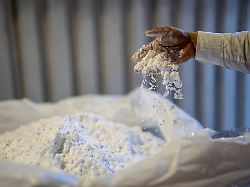Expand independence from China
EU relies on domestic processing of critical raw materials
7/1/2023 4:34 p.m
Certain raw materials such as lithium are urgently needed for the production of promising technologies such as batteries and solar power systems. So far, however, the EU is still heavily dependent on imports. That should change now.
In order to secure Europe’s supply of important raw materials, the EU countries want to further expand the domestic processing of the materials. The member states agreed, for example, that in future at least half of the annual consumption of strategically important raw materials should be processed in the EU. 20 percent should therefore come from recycling within the EU.
On the one hand, the rules for the supply of raw materials in the EU are intended to accelerate the conversion to a CO2-neutral economy. In addition, it should be ensured that the EU is not dependent on imports from individual countries such as China for important raw materials.
Certain raw materials such as lithium are urgently needed for the production of promising technologies such as batteries, wind and solar power plants. The EU Commission therefore submitted a proposal for a regulation on critical raw materials in mid-March.
The countries shared the goals pursued by the commission, it said. In some places they tightened the plans. In addition to higher quotas than those proposed by the Commission for processing (40 percent) and recycling (15 percent) by 2030, the countries also want aluminum to be counted as a strategic and critical raw material.
A list of all raw materials classified in this way should be updated every three years. A four-year cycle had previously been proposed here. Countries now have to negotiate with Parliament before the new rules can come into force.
